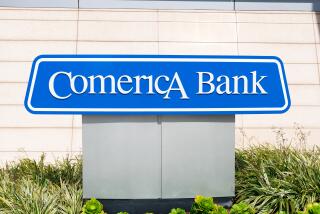Tougher Terms on Bank Bailout Deals : * Failures: Analysts say First Union Corp.’s accord with regulators is the shape of things to come.
- Share via
NEW YORK — First Union Corp.’s winning bid for Southeast Banking Corp. signals that U.S. regulators are cutting tougher deals for failed banks, creating a challenge for the merger of the two major Southern banks.
“First Union is taking a gamble here,” Paine Webber Inc. analyst Lawrence Cohn said. “It is buying a heck of a franchise, but it remains to be seen what price it is paying.”
The buyout, announced late Thursday, will eventually make Charlotte, N.C.-based First Union the 11th-largest banking company in the nation, with about $45 billion in assets.
First Union will pay the government $81 million and set aside a $131-million reserve fund for Southeast’s loan problems, bringing the cost to $212 million.
The deal raises competition with NCNB Corp., another Charlotte powerhouse. NCNB will become the fourth-largest bank in the nation once it completes its planned acquisition of C&S;/Sovran Corp. of Atlanta.
To make the merger work, First Union must undertake a Draconian cost-cutting program that slices $260 million of Southeast’s costs--or 49 cents of every dollar now spent.
First Union said Friday that it will drop up to 2,800 employees from Southeast Bank over the next 12 months, 500 of them by Jan. 1, 1992. First Union’s treasurer, Ken Stancliff, said in an interview that more than 40,000 man-hours were spent poring over Southeast’s books, and he is confident that the goals can be met.
Unlike previous government deals, however, the bank won’t have the luxury of shifting all of Southeast’s loan losses to the FDIC for the next three years.
The FDIC will shoulder 85% of Southeast’s bad consumer and commercial loans over five years, and First Union will keep 15%.
That may be the result of criticism that the FDIC has received from Congress over how it has handled bank failures--by selling the banks and keeping bad loans.
“This is nowhere near as clean a deal as Banc One Corp. or NCNB Corp. in Texas or Fleet/Norstar Financial Corp.’s deal in New England,” said Paine Webber’s Cohn, speaking of other takeovers of failed banks. “In all those cases, the government took essentially all the asset risk,” or bad loans.
More to Read
Inside the business of entertainment
The Wide Shot brings you news, analysis and insights on everything from streaming wars to production — and what it all means for the future.
You may occasionally receive promotional content from the Los Angeles Times.










